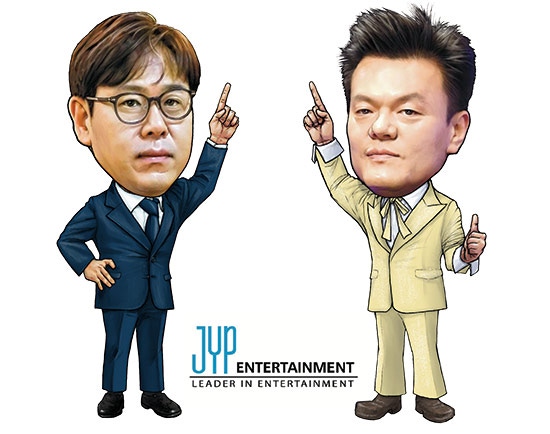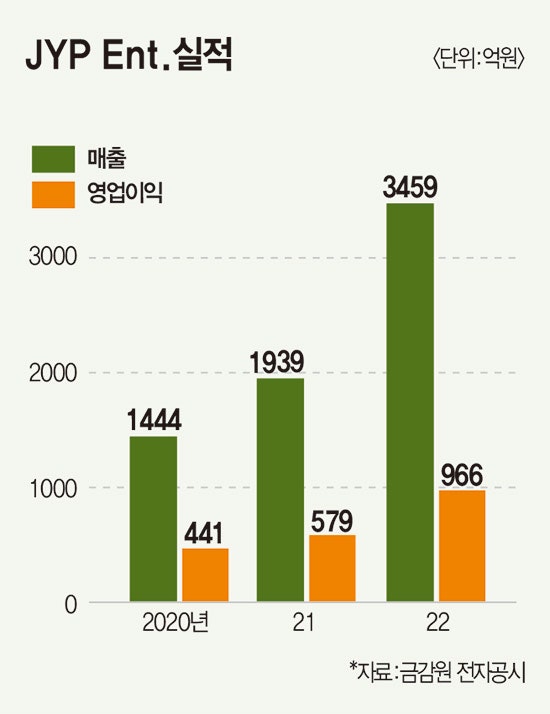[Non-SKZ] Reports march every day... JYP Entertainment CEO Jeong-wook and Park Jin-young CCO [CEO Lounge]
Reports march every day... JYP Entertainment CEO Jeong-wook and Park Jin-young CCO [CEO Lounge]
Artist IP Platform 'Multi-Label' Shows Perseverance

Born in 1971/ Korea University Department of History/ Cowon System/ 2003 JYP Entertainment/ 2007 JYP Entertainment CEO (current)
[Park Jin-young]
Born in 1972/ Yonsei University Department of Geology/ Singer/ 1999 JYP Entertainment Established/ JYP Entertainment CCO (current)This year, the stock price of JYP Entertainment (hereafter referred to as JYP Entertainment) changed its reported price every day. Recently, the market capitalization is in the top 5 on the KOSDAQ, looking at 5 trillion won. In the entertainment industry, it is attributed to the continuous strengthening of the competency of the main business without giving one's eyes to the wrong business. According to the Korea Exchange, the market capitalization, which was around 2 trillion won at the beginning of the year, surpassed 3 trillion won for the first time in April and settled at 4 trillion won in May, approaching 5 trillion won within a month. The secret is performance. After announcing earnings that exceeded market expectations, the stock price soared 21% on May 16 alone. JYP Entertainment's sales in the first quarter of this year were 118 billion won, up 74% from the same period a year ago. During the same period, operating profit more than doubled to 42 billion won.
The key driving force behind JYP Entertainment's rapid growth can be summarized into two main points.
First, it is a multi-label system. Multi-label is a system that systematically manages by attaching a dedicated organization to each artist. It is a structure in which individual artists move swiftly like multiple ' IP platforms'. According to the ESG (Environmental Social Governance) report published by
JYP Entertainment, JYP has five independent labels (Artist 1, 2, 3 Headquarters, SQU4D , STUDIOI have J). Artists belonging to Twice and Stray Kids belong to each headquarters, and processes such as marketing, planning, and management are independently promoted by the headquarters. It is analyzed that by efficiently operating specialized organizations for each artist, it became possible to measure and manage the productivity of the entire organization, which was considered a challenge in the entertainment industry. As it became possible to release more albums than in the past by narrowing the release interval of new songs, processes such as artist development, management, new song release, and merchandise sales were established systematically.
Currently, Hive and SM Entertainment, where BTS belongs, have introduced and are operating a multi-label system, but the original is JYP Entertainment. JYP Entertainment preemptively introduced the multi-label system in July 2018. At that time, JYP Entertainment's representative producer, Park Jin-young (Current JYP Entertainment Chief Creative Officer · CCO , 51), attended a special lecture and announced ' JYP Entertainment 2.0 Vision'. As the girl group TWICE, the first attempt at a multi-label system, became a huge success, this system was successfully established. In the past , JYP Entertainment was marketing, public relations, artist and repertoire ( A&R ·Each department was in charge of the work of all artists. The failure of JYP Entertainment , which dreamed of entering the US in 2011, became a decisive opportunity to change the business structure. Cha Yu-mi, an analyst at Mirae Asset Securities , said, "The introduction of multi-label allows us to establish multi- IP and create a stable and sustainable business structure."

and governance structure with a high degree of concentration on the main business. According to the Financial Supervisory Service's electronic disclosure, as of the end of the first quarter of this year, JYP Entertainment had 13 consolidated subsidiaries. Most of them are local corporations in Japan, Hong Kong, China, and the United States. The only place that has nothing to do with my main job, record production, is JYP Pictures, a content production company. JYP Pictures is also in the process of liquidation. They tried to create synergy by linking music production with movie and drama production, but failed to monetize it. JYP Entertainment focuses more on its main business, the record production business. JYP Publishing, which was a private company of CCO Park Jin-young, the largest shareholder , was also incorporated as a subsidiary of JYP Entertainment, and the governance structure was organized. On the other hand, SM has 29 consolidated subsidiaries. It has several subsidiaries unrelated to its main business, music, such as Keyeast, SM C&C , and SM Life Design. Among YG Entertainment's 19 subsidiaries, YG Studioplex (drama production company) and Greenworks (golf company), which have nothing to do with the music business, are included. The business structure with high concentration on the main business laid the foundation for solid performance. As the cost burden decreased, the financial structure improved. Thanks to
JYP Entertainment's operating margin last year was 28%, far more than twice that of YG (12%) and SM (11%).
JYP Entertainment has relatively low volatility in its governance structure. The key members of the board of directors who lead decision-making are the largest shareholder, CCO Jin-young Park , CEO Jeong-wook ( CEO , 52), and CFO Sang-bong Byeon , vice president. CEO Jung Wook and Vice President Byun joined JYP Entertainment in mid-2000. The relationship between the three is already looking at 20 years.
CEO Jeong Wook was born in 1971 and graduated from the Department of History at Korea University. He majored in history, but couldn't give up on music. After graduating from college, he founded a magazine and worked as a music critic. Afterwards, he worked for Geowon System (now Cowon System), a recorder manufacturer, and it is said that he met CCO Park. CEO Jung Wook, who joined JYP Entertainment in 2003 , focused on creating business synergies based on singer Rain , who was a leading star of JYP Entertainment at the time. Rain rose to become a global star with the full support of CEO Jung, and JYP Entertainment laid the foundation for growth. Recognized for his achievements, Jung was inaugurated as CEO in 2007.
Byun is credited with paving the way for growth by leading JYP Entertainment's backdoor listing on the KOSDAQ. JYP Entertainment was in a difficult financial situation after failing to enter the US in the early 2010s. He made a breakthrough through the merger and acquisition of J.Tune Entertainment and a bypass listing on the KOSDAQ, drawing a blueprint for a mid- to long-term growth strategy.
However, achieving results from diversification centered on highly related fields is a task that needs to be solved. This is also the reason CEO Jeong-wook and CCO Park are diversifying their business portfolio with fan communities and NFT platforms. In November 2020, JYP Entertainment started investing in a new business by investing about 5 billion won in Naver's metabus subsidiary 'Naver Jet'. In June 2021, it invested 21.4 billion won in Dear You, and five months later, it invested about 5 billion won in For By Four, a high-definition VFX content production company. Investments were made focusing on businesses that can expect synergy with the main business, such as metabus, fandom platform, and media. Recently, it also established a venture capital ( VC ) subsidiary. In 2021, he sought a joint venture with Dunamu to enter the NFT platform business, but when the business failed, it is interpreted that he established a VC himself.
In terms of governance structure, some point out that the 'balance of power' between inside and outside directors within the board of directors is asymmetric. The influence of the three executive directors, Park Jin-young, Jung-wook Jeong, and Byun Sang-bong, who have been working together for a long time, is very great. The chairman of the board of directors has also been taken over by CEO Jeong-wook. When the power of organizational decision-making is concentrated in a small number of inside directors, it is difficult to reflect the voices of outside directors. JYP Entertainment plans to use the pool of outside directors widely to ensure that the independence and diversity of the board of directors is not compromised.



